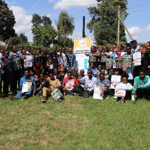
In the sprawling Eastlands of Nairobi, Kenya, the harsh reality of Karamajong girls trapped in labour syndicates stands as a stark reminder of the exploitation facing vulnerable communities. These young girls, originally from Uganda, are subjected to long hours of labor, physical abuse, sexual exploitation, early pregnancies and degrading living conditions. Often denied access to education and basic rights, their experiences highlight the urgent need for meaningful intervention. Inspired by Pope Francis’ call for mercy and compassion, as a collective movement we began to restore hope—offering these girls education, training and the possibility of a new life rooted in dignity and self-worth.
The Karamajong Girls Empowerment Program, led by the Project of Women in Faith Fellowship, held its inaugural meeting at the AOSK Tumaini Center in January 2024. The session focused on motivation, empowerment, gender equality and practical strategies for rescuing and rehabilitating the girls. Participants examined the systemic challenges the girls face ranging from the denial of education to exploitation and violence. The dialogue also explored root causes such as poverty, forced marriages and peer pressure, which laid the groundwork for targeted interventions that address both their immediate needs and long-term change. Interventions were designed with flexibility in mind, responding to the unique goals and circumstances of each girl.
A major milestone in the program was the successful repatriation of ELEVEN Karamajong girls to Uganda, where they began vocational training at the St. Bakhita Institute, run by the Sisters. There, the girls gained practical skills in hairdressing and small business development, tools essential for economic independence. This emerged as a central pillar of the program, empowering the girls not only with knowledge but also with confidence and purpose. Additionaly, this Sister provided a source of spiritual encouragement, further nurturing their emotional and personal growth.

In February 2024, the initiative expanded with the launch of an Action Plan for The Remaining Karamajong Girls In Kamukunji. Working alongside children’s officers, the program explored ways to facilitate repatriation, family reunification and re-enrollment in schools or vocational training. Around 30 girls participated, voicing aspirations to pursue tertiary education and gain hands-on skills in fields such as computer basics, crafts and business management.
With its compassionate, community-driven and structured approach, the program showcases the power of collective action in driving transformation. By addressing universal barriers and equipping the girls with skills and support, the initiative lights a path toward self-reliance and resilience. More than just restoring dignity, it gives them a genuine chance to thrive.



